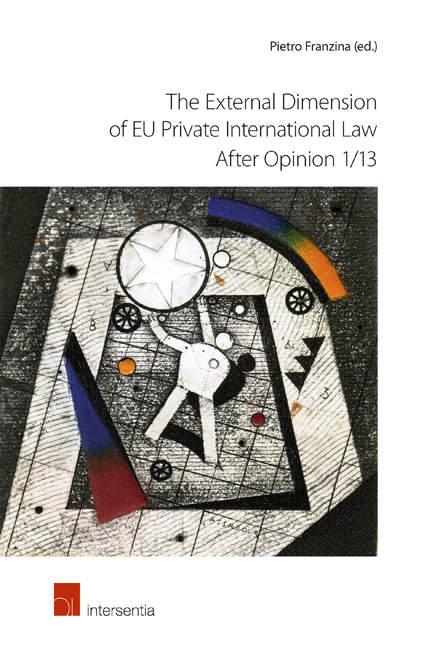Book contents
- Frontmatter
- Preface
- Contents
- PART I THE INTERNATIONAL PROJECTION OF EU PRIVATE INTERNATIONAL LAW - SOME BASIC ISSUES
- PART II OPINION 1/13 AND ITS IMPLICATIONS
- PART III THE CHANGING FEATURES OF EU EXTERNAL RELATIONS IN THE AREA OF PRIVATE INTERNATIONAL LAW
- PART IV EU LEGISLATION ON PRIVATE INTERNATIONAL LAW AND EXTRA-EUROPEAN SITUATIONS
- The Interplay of EU Legislation and International Developments in Private International Law
The Interplay of EU Legislation and International Developments in Private International Law
from PART IV - EU LEGISLATION ON PRIVATE INTERNATIONAL LAW AND EXTRA-EUROPEAN SITUATIONS
Published online by Cambridge University Press: 15 December 2017
- Frontmatter
- Preface
- Contents
- PART I THE INTERNATIONAL PROJECTION OF EU PRIVATE INTERNATIONAL LAW - SOME BASIC ISSUES
- PART II OPINION 1/13 AND ITS IMPLICATIONS
- PART III THE CHANGING FEATURES OF EU EXTERNAL RELATIONS IN THE AREA OF PRIVATE INTERNATIONAL LAW
- PART IV EU LEGISLATION ON PRIVATE INTERNATIONAL LAW AND EXTRA-EUROPEAN SITUATIONS
- The Interplay of EU Legislation and International Developments in Private International Law
Summary
THE VIRTUAL GLOBAL REACH OF EU LEGISLATION ON PRIVATE INTERNATIONAL LAW
When judicial cooperation in civil matters was still in its early stage of development within the EU legal system, some expressed the view that EU legislation in this area could address only matters featuring a strictly European character, that is matters connected solely, or essentially, with two or more Member States. The view rested on the assumption that EU private international law is basically concerned with the diversity of Member States’ legal systems and with the challenges posed by that diversity to the proper functioning of the internal market. According to this opinion, the regional unification of private international law was meant, as such, to improve the coordination between the legal systems of the various Member States. Situations linked with a third country were regarded as lying, in principle, outside the scope of EU law, and accordingly left to the domestic rules of private international law of the Member States, or to uniform rules to be agreed upon between individual Member States, on the one hand, and the third countries concerned, on the other.
This approach no longer finds support in legal literature and within the institutions. Today, it is generally accepted that EU legislation in the field of private international law can address, in principle, both intra-European and extra-European situations. The Court of Justice acknowledged in Opinion 1/03 that EU measures relating to judicial cooperation are not intended only ‘for intra-Community disputes’, but are concerned, more generally, with situations featuring ‘an international element’. The actual legislative measures enacted on the basis of Article 81 TFEU (previously, Article 65 TEC) show that the EU political institutions are in no way reluctant to regulate relationships that feature a significant connection with third countries. As a matter of fact, extra-European situations are normally dealt with under the same measures that govern purely regional matters.
- Type
- Chapter
- Information
- Publisher: IntersentiaPrint publication year: 2016

